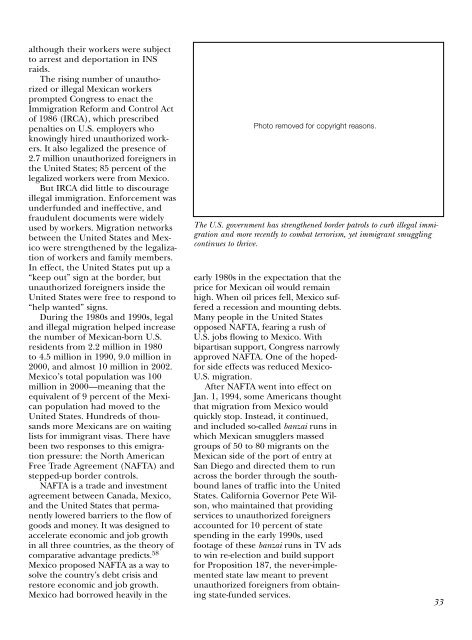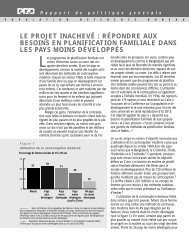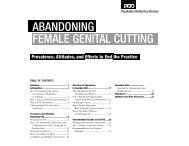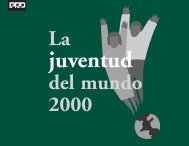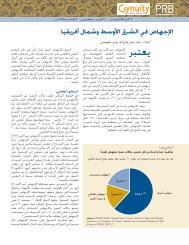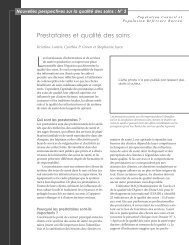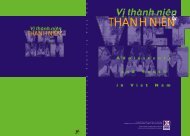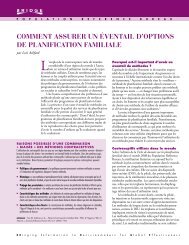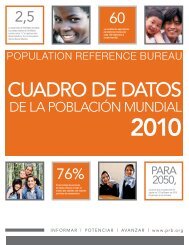Immigration Shaping America - Population Reference Bureau
Immigration Shaping America - Population Reference Bureau
Immigration Shaping America - Population Reference Bureau
You also want an ePaper? Increase the reach of your titles
YUMPU automatically turns print PDFs into web optimized ePapers that Google loves.
although their workers were subject<br />
to arrest and deportation in INS<br />
raids.<br />
The rising number of unauthorized<br />
or illegal Mexican workers<br />
prompted Congress to enact the<br />
<strong>Immigration</strong> Reform and Control Act<br />
of 1986 (IRCA), which prescribed<br />
penalties on U.S. employers who<br />
knowingly hired unauthorized workers.<br />
It also legalized the presence of<br />
2.7 million unauthorized foreigners in<br />
the United States; 85 percent of the<br />
legalized workers were from Mexico.<br />
But IRCA did little to discourage<br />
illegal immigration. Enforcement was<br />
underfunded and ineffective, and<br />
fraudulent documents were widely<br />
used by workers. Migration networks<br />
between the United States and Mexico<br />
were strengthened by the legalization<br />
of workers and family members.<br />
In effect, the United States put up a<br />
“keep out” sign at the border, but<br />
unauthorized foreigners inside the<br />
United States were free to respond to<br />
“help wanted” signs.<br />
During the 1980s and 1990s, legal<br />
and illegal migration helped increase<br />
the number of Mexican-born U.S.<br />
residents from 2.2 million in 1980<br />
to 4.5 million in 1990, 9.0 million in<br />
2000, and almost 10 million in 2002.<br />
Mexico’s total population was 100<br />
million in 2000—meaning that the<br />
equivalent of 9 percent of the Mexican<br />
population had moved to the<br />
United States. Hundreds of thousands<br />
more Mexicans are on waiting<br />
lists for immigrant visas. There have<br />
been two responses to this emigration<br />
pressure: the North <strong>America</strong>n<br />
Free Trade Agreement (NAFTA) and<br />
stepped-up border controls.<br />
NAFTA is a trade and investment<br />
agreement between Canada, Mexico,<br />
and the United States that permanently<br />
lowered barriers to the flow of<br />
goods and money. It was designed to<br />
accelerate economic and job growth<br />
in all three countries, as the theory of<br />
comparative advantage predicts. 58<br />
Mexico proposed NAFTA as a way to<br />
solve the country’s debt crisis and<br />
restore economic and job growth.<br />
Mexico had borrowed heavily in the<br />
Photo removed for copyright reasons.<br />
The U.S. government has strengthened border patrols to curb illegal immigration<br />
and more recently to combat terrorism, yet immigrant smuggling<br />
continues to thrive.<br />
early 1980s in the expectation that the<br />
price for Mexican oil would remain<br />
high. When oil prices fell, Mexico suffered<br />
a recession and mounting debts.<br />
Many people in the United States<br />
opposed NAFTA, fearing a rush of<br />
U.S. jobs flowing to Mexico. With<br />
bipartisan support, Congress narrowly<br />
approved NAFTA. One of the hopedfor<br />
side effects was reduced Mexico-<br />
U.S. migration.<br />
After NAFTA went into effect on<br />
Jan. 1, 1994, some <strong>America</strong>ns thought<br />
that migration from Mexico would<br />
quickly stop. Instead, it continued,<br />
and included so-called banzai runs in<br />
which Mexican smugglers massed<br />
groups of 50 to 80 migrants on the<br />
Mexican side of the port of entry at<br />
San Diego and directed them to run<br />
across the border through the southbound<br />
lanes of traffic into the United<br />
States. California Governor Pete Wilson,<br />
who maintained that providing<br />
services to unauthorized foreigners<br />
accounted for 10 percent of state<br />
spending in the early 1990s, used<br />
footage of these banzai runs in TV ads<br />
to win re-election and build support<br />
for Proposition 187, the never-implemented<br />
state law meant to prevent<br />
unauthorized foreigners from obtaining<br />
state-funded services.<br />
33


